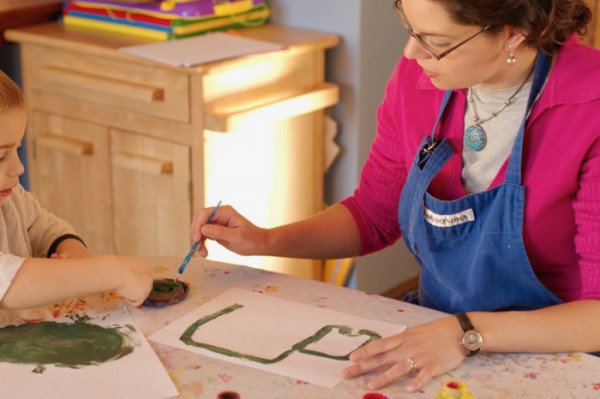The glass left my hand and slammed into the wall on the far side of the bedroom, shattering into hundreds of shards on the carpet.
As I turned to the side, I caught a glimpse of my reflection in the mirror before sinking to the ground in sobs.
I didn’t recognize myself.
I had managed fairly well as a mom with just one child to care for. I had time to rest during my son's naps and, after he began sleeping through the night, long evenings to spend alone with my husband. Even sleep deprivation was almost endurable with just one baby.
But when one baby became two, my margin dissipated and my stress levels rose. And when two became three, I reached a breaking point.
It wasn’t that I didn’t love my children. It wasn’t that I didn’t want to care for them. I wanted to do both of those things. They had been my dreams.

But as an introverted mother, the sudden increase in noise and in chaos kept my nervous system in overdrive every day. I didn’t understand that at the time, though.
That outburst with the glass happened over ten years ago, thankfully without anyone present, but I’ll never forget it. I realized I could no longer continue just getting by. I could no longer ignore the warning signs.
“What is wrong with me? Why can’t I do this?” I berated myself.
Not long ago, I came across a list of the major factors that stress out my particular personality type. I had to laugh (or cry) when I realized that nearly all of them appear repeatedly in a mom’s daily life! Can you relate?
Introverted Stressors (with my own notes added as they relate to motherhood):
■ Having to focus too much on sensory/concrete details (“Mom, what’s for breakfast, lunch, dinner?!”)
■ An overload of sensory stimulation or noise (Um, hello, children!)
■ Interruptions (Like I said.)
■ Distress within close relationships (All. the. time.)
■ Having values violated (Wanting to change the world, changing diapers instead.)
■ Not enough alone time. Too much extroverting. (Hmm, just a tad.)
■ Working with closed-minded people (Oh, of course you’re having a tantrum because your toothbrush is blue, not red!)
■ Not receiving appreciation or understanding (Here’s looking at you, kid.)
■ Unfamiliar environments with excessive amounts of details (Sounds like a group playdate.)
■ Having plans disrupted (Part of the job description, right?)
■ Not having a clear direction (But somehow I’m the one in charge!)
■ Lack of harmony (Sibling drama, anyone?)
■ Criticism and conflict (Rinse and repeat.)
■ Not being able to use intuition or envision the future (Yep, no idea how this experiment will turn out.)
■ Having to focus too much on the present (All day, every day.)
“When under stress,” the article went on, my type “may become uncharacteristically angry and quick-tempered, unreasonable, and irrational.” Yeah, you got me. They might as well have added, “may begin to throw breakable objects at any time."

What I’ve Learned About Anger
I never thought of myself as an angry person until I had kids. Ever. As a young mom, however, I didn’t understand enough about my personality to make sense of the transition I was undergoing as an introvert.
But throughout the past decade of parenting life, I’ve learned three truths about anger that comfort me.
1. Anger is the natural response to the hard parts of motherhood, especially as an introvert.
For years, a pleasant, magical mother lived in my head, taunting me. She never got angry, but responded to her children in a sing-song voice like this:
“Oh, you bit your brother again? Don’t do that, sweetie!” (spoken while gathering child in a hug).
“You threw your toys all over the room during a tantrum and broke a window? We’re both going to laugh about this someday!”
“You didn’t like any of your birthday presents? I’m sorry. What else can we get you?”
Realizing that anger is the natural response to these situations, and in itself not wrong, lifted a huge weight of guilt off my shoulders.
2. Anger is an indicator to pause or change something.
Comparing anger to hunger helps. After all, we don’t try to eliminate hunger from our lives. It’s just a cue, a signal that our body needs fuel. Anger is also a cue from our body, a signal that we need to pause.
We don’t just “press through” for the sake of it. We change course, walk away, breathe before dealing with the situation. Anger points the way toward peace if we pay attention.
3. Quiet is a must for an introverted mom.
Our kids cannot flourish in our homes if we constantly live on the edge of our personalities. We are all connected within these walls. That means we must do whatever we can to recharge on a daily basis.
We can lament this fact or view it as a gift. Regardless, it is a necessity, and if we neglect it, every person in our home will pay the price.
By taking care of ourselves, we can care for others well. And this, after all, is what we most long to do.

Are you an introverted mom as well?
Check out Jamie's new book, Introverted Mom: Your Guide to More Calm, Less Guilt, and Quiet Joy.
Related video:
This post comes from the TODAY Parenting Team community, where all members are welcome to post and discuss parenting solutions. Learn more and join us! Because we're all in this together.
